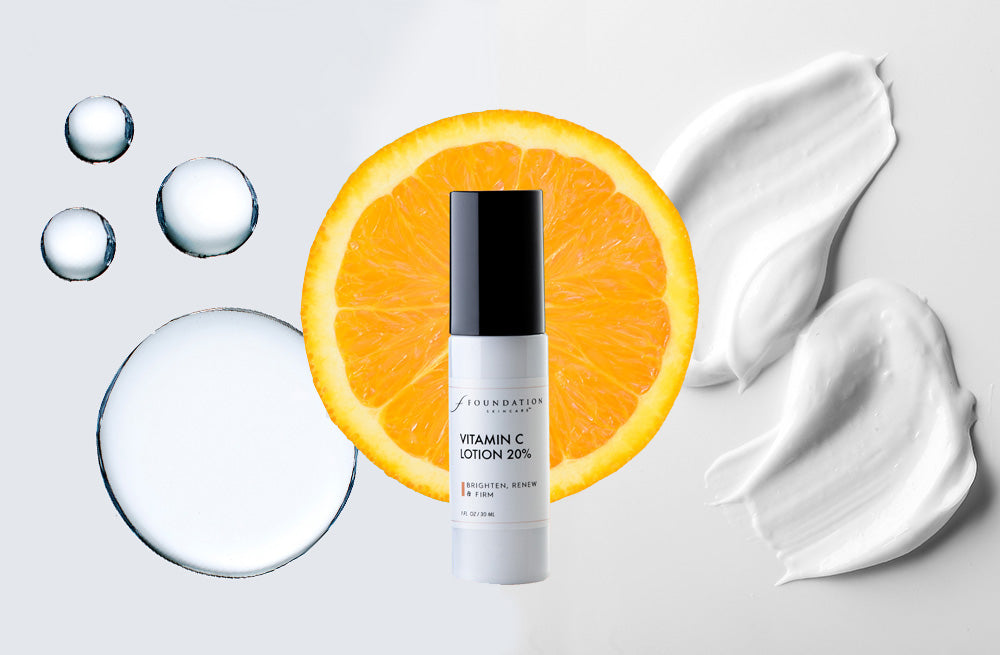If you’re thinking about adding vitamin C to your routine, it’s important to consider the formulation. While there’s a good chance you’re already familiar with vitamin C serums, it’s also worth looking into vitamin C lotions. Let’s discuss the differences and similarities of a vitamin C serum vs. moisturizer, and how to pick the best formula for your needs.
What Does Vitamin C Target?
Vitamin C is a multi-tasking ingredient that’s able to tackle multiple skin concerns at once. This ingredient can help slow down the production of melanin, which makes it a highly effective solution for fading the appearance of melasma, post-inflammatory hyperpigmentation, and age spots.1 It can also brighten the skin for a more radiant complexion.
This vitamin is also a powerful ingredient for anyone looking to minimize signs of aging. It stimulates the production of collagen, helping to soften fine lines and wrinkles while boosting firmness and elasticity.2 Since vitamin C is an antioxidant, it also defends the skin against the damaging effects of free radicals, which can cause visible signs of aging.
Vitamin C Lotion vs. Serum
At Foundation Skincare, we offer the Vitamin C Lotion, a dermatologist-formulated solution that blends a potent 20% concentration of ascorbic acid (a stable and absorbable form of vitamin C) with a moisturizing base.
While the Foundation Skincare Vitamin C Lotion shares similarities with traditional vitamin C serums, there are some key differences worth knowing before making your final selection.
Differences
The biggest difference you’ll immediately notice is the consistency. Vitamin C serums tend to be lighter and have a more watery consistency, whereas a vitamin C lotion will be thicker.
This will ultimately affect how the formula feels and affects the skin. A vitamin C lotion will have a more moisturizing base, helping to keep the skin hydrated and support the barrier. This can be especially helpful for those with dry or sensitive skin, since vitamin C can cause irritation and dryness in higher concentrations.
Vitamin C Lotion 20%
• Increased collagen production renews skin
• Antioxidant power repairs discoloration
With the Foundation Skincare Vitamin C Lotion, Dr. Nuara was able to create a highly potent formula that is still gentle enough for sensitive skin, since it has a moisturizing base. The formula is thicker than a serum, but is still light enough so that it doesn’t feel heavy on oilier skin types.
On the other hand, many vitamin C serums are made with lightweight hydrating ingredients, such as hyaluronic acid and glycerin. However, given the lighter consistency, they aren’t going to be able to provide that same level of moisturization as a lotion.
Similarities
While lotions and serums have different consistencies, they do offer the same vitamin C benefits. If you take two formulas that both contain the same concentration of vitamin C, you can expect to get comparable anti-aging and radiance-boosting results.
Benefits
As noted, the main benefit of using a vitamin C lotion is that it can provide moisturizing benefits to the skin to help counteract the potentially irritating or drying effects of vitamin C. By comparison, while a serum won’t be able to provide the same level of moisturization, it still offers the similar vitamin C benefits.
The Foundation Skincare Vitamin C Lotion is also crafted with vitamin E, which adds extra antioxidant power to the formula. This ingredient also enhances the power of vitamin C to boost results.
Which Should You Use?
This leads us to the final question: is vitamin c serum or lotion better? Ultimately, as long as you are using an expertly formulated solution, both types of formulas can help you get the full anti-aging, antioxidant, and brightening benefits of vitamin C.
At Foundation Skincare, the Vitamin C Lotion was created to give customers a dual formula that maximizes the potential of vitamin C while still ensuring the skin stays comfortable. This makes it easy to work a highly potent formula into your routine to help you achieve optimal results.
References:
-
https://www.ncbi.nlm.nih.gov/pmc/articles/PMC5579659/
-
https://www.ncbi.nlm.nih.gov/pmc/articles/PMC5605218/





